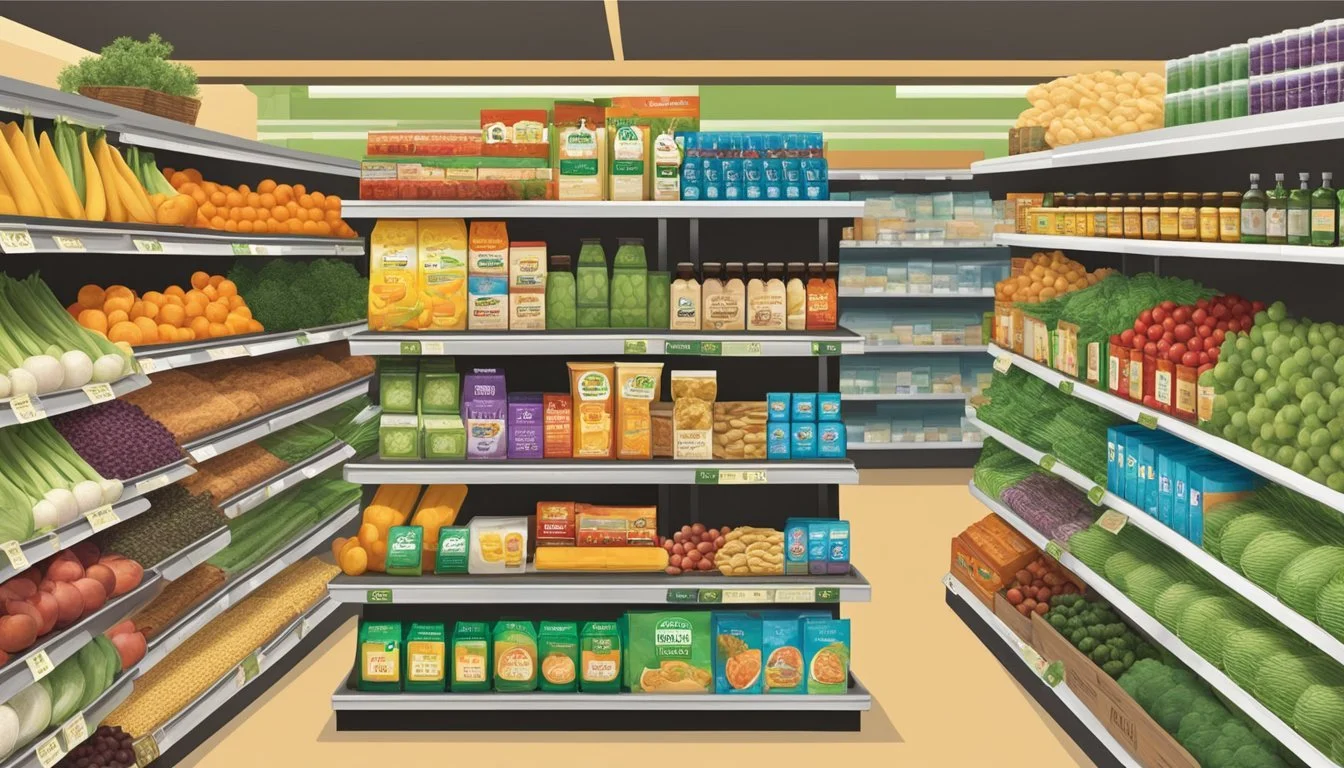Is Whole Foods Cheaper Than Winn-Dixie?
Comparing Grocery Store Prices
Part of Our Grocery Store Guide with Details on Whole Foods Market Prices and Winn-Dixie Prices
When comparing grocery stores in terms of pricing, Whole Foods Market and Winn-Dixie often come up in the conversation for consumers looking to balance quality with cost. Whole Foods, a supermarket chain known for its organic and natural products, has long been perceived as a higher-priced retailer. However, it also offers its 365 Everyday Value line, a brand that promises high quality at lower prices.
On the other hand, Winn-Dixie, a staple in the southern United States, tends to fly under the radar when it comes to discussions about cost. Yet, they provide their own SE Grocers products, which are said to be approximately 20% cheaper than comparable national brands. This indicates that Winn-Dixie's value proposition might be stronger for those seeking to stretch their grocery budgets further.
The difference in pricing between these two chains underscores the importance of understanding where value intersects with cost. Consumers might find that for certain product categories, one store might edge out the other. Whether one prefers organic selections from Whole Foods or the cost-friendly options at Winn-Dixie, choices often reflect individual priorities such as price sensitivity, dietary preferences, and product availability.
Comparing Grocery Store Profiles
This section provides a snapshot of Whole Foods Market and Winn-Dixie stores, along with a brief mention of their competitors, focusing on their unique store profiles and how they position themselves in the supermarket landscape.
Whole Foods Market Overview
Whole Foods Market is a chain of supermarkets that specializes in offering organic products, high-quality natural foods, and eco-friendly goods. Since its acquisition by Amazon, the expansion of Whole Foods has continued, serving customers who prioritize quality and a wide range of organic options. Customers can find the 365 Everyday Value line, which presents competitively priced alternatives to national brands while maintaining a focus on quality.
Winn-Dixie Store Insights
Winn-Dixie Stores, Inc. is a supermarket chain that emphasizes affordability without compromising quality. Their store brand, SE Grocers, reportedly offers products that are generally 20% cheaper than national brands. This appeals to consumers who are cost-conscious but still interested in maintaining a certain standard for their groceries.
Other Competitors
Whole Foods and Winn-Dixie face competition from various other supermarkets. Walmart and Target are known for their extensive reach and competitive pricing. Aldi is recognized for its efficiency and cost-saving strategies that include a selection of predominantly private-label goods. Publix, Kroger, and Costco are also significant players offering varying combinations of value, quality, and convenience. Meanwhile, Trader Joe's is often cited for pricing around 20% cheaper than Whole Foods for similar items, signifying its strong value proposition in the market.
Price Analysis
When evaluating which grocery store offers the best prices, it is essential to compare common items and consider factors that affect pricing. This section provides an analysis of whether Whole Foods is cheaper than Winn-Dixie, focusing on the price comparison basis, the factors influencing cost, and how branding affects prices.
Price Comparison Basis
Whole Foods historically known for its higher prices due to its quality and organic offerings, has been taking steps to become more competitive. The store's own 365 Everyday Value brand is priced to compete with national brands and is often used as a benchmark for price comparison. On the other hand, Winn-Dixie frequently offers lower prices on similar products. For example, based on recent data:
White Bread: Whole Foods - $2.49, Winn-Dixie - $2.19
Gallon of Milk: Whole Foods - $3.29, Winn-Dixie - $3.09
Dozen Eggs: Whole Foods - $1.99, Winn-Dixie - $1.89
In summary, while the prices of some items may be lower at Whole Foods, overall, Winn-Dixie often provides more savings on day-to-day goods.
Cost Factors in Pricing
The pricing at Whole Foods and Winn-Dixie is influenced by several factors:
Quality: Whole Foods often offers organic and higher-quality items, which command a higher price.
Store Brands vs. National Brands: Store brands such as Whole Foods' 365 Everyday Value and Winn-Dixie's SE Grocers can deliver savings compared to national brand counterparts.
Product Sourcing: Whole Foods tends to source from suppliers with certified organic and non-GMO products, which may contribute to higher costs.
These factors must be considered when evaluating the stores' pricing strategies and consumers' potential savings.
Impact of Branding on Prices
Branding plays a significant role in the perception and pricing of products. Whole Foods, associated with a health-conscious, eco-friendly image, often justifies its pricing through the quality and origins of its offerings. For example, surveys have shown that the price of Whole Foods' produce was once 7% cheaper than Kroger's, illustrating how branding and market positioning can impact pricing.
Winn-Dixie’s branding emphasizes cost-efficiency and savings. Its SE Grocers brand is reputed to be approximately 20% cheaper than national brands while maintaining comparable quality, offering significant savings for price-sensitive shoppers. This highlights that branding can influence not only consumer perception but the actual prices consumers pay.
Product Selection
When comparing Whole Foods and Winn-Dixie, their product selection varies notably in terms of quality, range, and focus on specialty items. Each store caters to different consumer needs and preferences, offering a distinct shopping experience in their produce, meat, dairy, dry goods, and specialty foods departments.
Produce Quality and Variety
Whole Foods prides itself on a wide array of fresh produce, including organic and conventional fruits and vegetables. The store is known for its commitment to high-quality, organic produce, which appeals to health-conscious shoppers. Winn-Dixie, while offering a respectable variety of fruits and vegetables, places an emphasis on affordability with their selection, including the SE Grocers store brand.
Meat and Dairy Departments
The meat department at Whole Foods boasts a selection of meats that adhere to high animal welfare standards, including options for grass-fed and organic meats. In dairy, they offer a plethora of organic and allergen-friendly options. Winn-Dixie provides a varied meat selection as well, often at more competitive prices, and their dairy aisle includes popular national brands alongside the store’s own SE Grocers alternatives.
Dry Goods and Pantry Staples
Both retailers offer an array of dry goods and pantry staples, such as bread, pasta, rice, and cereals. Whole Foods' focus is on providing options that are organic or contain no artificial preservatives. Winn-Dixie has competitively priced staples with their in-house SE Grocers brand catering to budget-conscious consumers.
Specialty and Dietary Options
Whole Foods Market truly excels in specialty and dietary options. It offers an extensive range of vegan, gluten-free, and allergen-friendly products, targeting consumers with specific dietary needs. Winn-Dixie also carries a selection of specialty products, though their range may not be as broad as Whole Foods', they strive to meet the needs of their customer base with essential specialty items.
Store Brand Offerings
When comparing Whole Foods and Winn-Dixie, it's essential to consider their store brand offerings, which play a significant role in cost-saving strategies for the budget-conscious shopper.
Whole Foods' 365 Everyday Value
Whole Foods Market provides consumers with its 365 Everyday Value line, which is recognized for balancing high quality with more affordable pricing. These products often align with the store's focus on organic and health-conscious offerings. For customers with Amazon Prime memberships, additional savings on these items can be realized, enhancing the value proposition of this in-house brand.
Winn-Dixie's SE Grocers
Winn-Dixie, on the other hand, competes with its SE Grocers products. Emphasizing cost-effectiveness, these items are typically about 20% cheaper than comparable national brands, offering significant savings. The brand encourages consumers to enjoy both familiarity and affordability, delivering a tailored shopping experience that meets their expectations for both quality and budget-friendly options.
Customer Experience
In analyzing the customer experience at Whole Foods Market and Winn-Dixie, critical factors such as store layout and navigation, customer service, and additional services and programs play pivotal roles in shaping a shopper's supermarket journey.
Store Layout and Navigation
Whole Foods Market prides itself on an intuitively designed store layout that promotes an upscale shopping experience. Customers often find that the arrangement of aisles and the availability of products cater to an organic and health-conscious consumer base. In contrast, Winn-Dixie typically offers a more conventional supermarket layout, focusing on accessibility and efficiency that appeals to customers seeking everyday essentials.
Customer Service
Customer service is a cornerstone of both Whole Foods Market and Winn-Dixie. At Whole Foods, staff are often lauded for their knowledge and helpfulness, particularly when guiding customers through an array of organic and specialty products. Winn-Dixie also places a significant emphasis on customer service, with emphasis on speed and convenience, reflected in their checkout experience—aiming to quickly assist customers in completing their purchases.
Bonus Services and Programs
Whole Foods Market differentiates itself through additional services and programs, leveraging its relationship with Amazon Prime to offer exclusive membership discounts and benefits, enhancing the value proposition for its customers. Rewards programs at Winn-Dixie also offer unique savings, but with a focus on value rather than premium services. Both supermarkets conduct customer surveys to gather feedback and improve their offerings, tailoring the store experience to meet consumer needs more effectively.
Deals and Savings Opportunities
When comparing Whole Foods Market and Winn-Dixie, customers are offered various deals and savings opportunities. These come through weekly ads, seasonal discounts, loyalty programs, and their individual coupon policies.
Weekly Ads and Seasonal Discounts
Both Whole Foods Market and Winn-Dixie present customers with weekly ads that feature discounts on a variety of products. Whole Foods Market promotes sales such as 10% off select sales for Amazon Prime members, and also showcases its 365 brand that offers products with high-quality ingredients at lower prices. Winn-Dixie highlights SE Grocers products, which are reported to be 20% cheaper than national brands, and regularly includes holiday specials in their ads, making seasonal savings accessible.
Loyalty Programs and Benefits
Winn-Dixie operates a free Winn-Dixie Rewards program that offers one point for every $2 spent. These points can be converted into savings on groceries or gas rewards, providing a strong loyalty incentive. Whole Foods Market, though it eliminated its traditional loyalty program after its acquisition by Amazon, offers savings and exclusive offers to Amazon Prime members, which can include special discount pricing and benefits at Whole Foods Market locations.
Coupon Policies and Price Match
Winn-Dixie accepts manufacturer coupons and sometimes provides store coupons to further help customers save. They also have a FuelPerks! program offering discounts on fuel with purchases at Winn-Dixie stores. Whole Foods Market does not explicitly offer price matching, but it provides various ways to save, such as through Amazon Prime deals, sales, and discounts on its 365 Everyday Value line. Customers can optimize their savings by staying updated with available coupons and offers at both stores.
Online Shopping and Delivery Services
In the realm of grocery shopping, both Whole Foods and Winn-Dixie have embraced the convenience of online shopping, with options ranging from home delivery to curbside pickup, thereby tailoring services to address diverse customer preferences and needs.
E-Commerce Platforms
Whole Foods Market, now a subsidiary of Amazon, utilizes Amazon Fresh for its online grocery shopping services. Customers can shop through Amazon's web portal or the mobile app. Shoppers at Winn-Dixie can make their selections via Winn-Dixie's own website or mobile app, both designed to facilitate the e-commerce experience with user-friendly navigation.
Home Delivery and Pickup Options
Whole Foods offers home delivery for Prime members, often with delivery fees included in the membership, while non-Prime members can expect delivery charges. Winn-Dixie provides shoppers with home delivery and curbside pickup services. Delivery fees at Winn-Dixie may vary, and they sometimes offer promotions to reduce costs.
Subscription Services and Their Benefits
An Amazon Prime subscription includes benefits such as expedited shipping and free delivery on Amazon Fresh orders, provided these meet the order minimum requirements. Similarly, Winn-Dixie might offer subscription services or affiliate programs that present savings on delivery fees and exclusive deals, enhancing the value proposition for frequent online shoppers.
Health and Sustainability Considerations
When comparing Whole Foods Market and Winn-Dixie, their approach to health and sustainability often influences consumer choices. Both stores have unique strategies regarding organic offerings, environmental policies, and ethical sourcing, impacting their reputation for health and sustainability.
Organic and Non-GMO Offerings
Whole Foods Market is synonymous with health-related quality and sustainability, emphasizing organic and non-GMO products. It adheres strictly to organic standards, which prohibit the use of synthetic fertilizers and pesticides. Organically grown produce and non-GMO products are mainstays, backed by certifications such as the USDA Organic seal and Non-GMO Project verification.
Winn-Dixie offers a range of SE Grocers products, including items that are 20% cheaper than comparable national brands. While less emphasized than at Whole Foods, Winn-Dixie also includes organic options, catering to a cost-conscious demographic that still values quality.
Environmental Policies
Whole Foods Market has built a reputation on its environmental stewardship. Initiatives like eco-friendly packaging and recycling programs support its commitment to sustainability. They have also made strides in reducing waste, with programs to lessen single-use plastics and a preference for bulk goods.
On the other hand, Winn-Dixie's approach to environmental policy is less publicized. However, the store does participate in some community-based recycling programs and is known to offer products with sustainability in mind, such as locally sourced produce when available.
Ethical Sourcing and Fair Trade
Ethical sourcing and fair trade are pivotal to Whole Foods Market's supply chain. The company ensures its products are ethically sourced and often features items with Fair Trade certifications, which support responsible company practices and just compensation for producers.
Winn-Dixie also considers the ethical aspects of their product range, albeit less prominently than Whole Foods. They provide a selection of fair trade goods and emphasize supply chain transparency where it aligns with consumer demand for responsibly sourced products.
Conclusion
When it comes to comparing Whole Foods and Winn-Dixie, one must consider the value proposition each store offers. Whole Foods is known for its 365 Everyday Value line, which presents a range of high-quality items at prices lower than some national brands. Conversely, Winn-Dixie is often recognized for its own SE Grocers products, which are priced approximately 20% cheaper than comparable national brands.
Price comparisons suggest that while Whole Foods provides an assortment of quality goods, Winn-Dixie tends to have lower prices on everyday staples. A shopper's preference might vary based on individual priorities such as organic options, brand variety, and budget constraints.
For consumers primarily concerned with the cost, Winn-Dixie may be the preferred choice. However, those who place a higher value on organic products and a wider variety of specialty items might lean towards Whole Foods despite the price premium.
In summary, shoppers should weigh the importance of price versus product offerings when choosing between these two grocery stores. Both cater to different market segments, and the decision should align with one's shopping priorities and personal values.
Store Value Proposition Whole Foods Quality products, 365 Everyday Value line Winn-Dixie Lower pricing, SE Grocers line, cost savings
Recommendations for consumers are to compare prices on items they purchase regularly and consider the overall shopping experience each store offers, including customer service, location convenience, and product variety.










